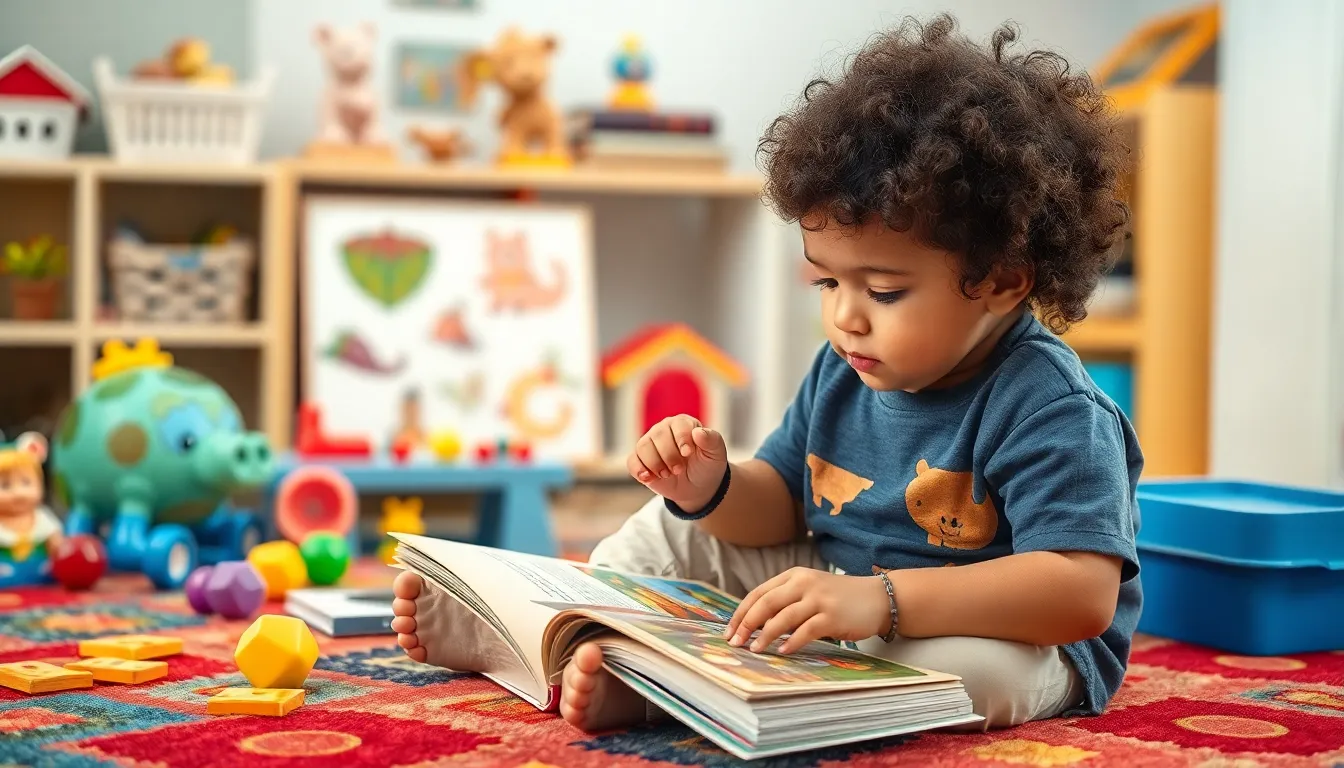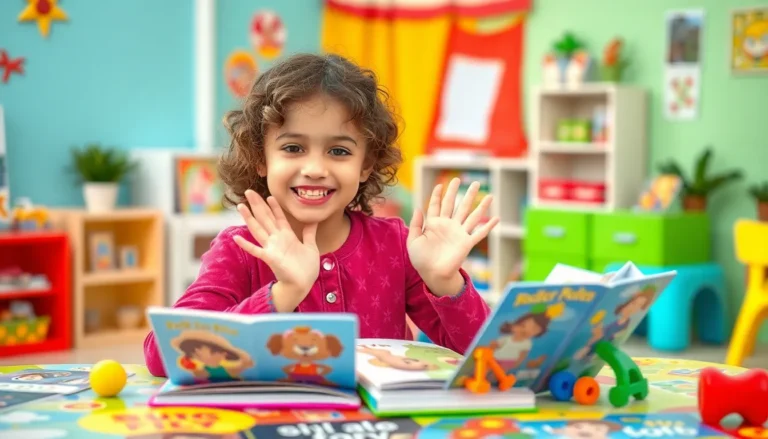In a world overflowing with emojis and abbreviations, teaching kids language skills might feel like a Herculean task. But fear not! With the right approach, children can master language like pros while having a blast. Imagine your little one not just stringing words together but crafting stories that could rival bestsellers—okay, maybe not yet, but they’ll get there!
Language skills lay the foundation for effective communication, creativity, and even social interactions. Whether it’s learning the art of storytelling or mastering the nuances of conversation, these skills are essential for success. So let’s dive into the fun ways to boost your child’s language abilities and turn them into the next great wordsmith. After all, who wouldn’t want a kid that can charm their way out of a tantrum with just the right words?
Table of Contents
ToggleImportance Of Language Skills For Kids
Language skills play a crucial role in a child’s overall development. Strong communication abilities allow children to express thoughts and ideas effectively. Enhanced language proficiency supports academic success, as it relates to reading and writing capabilities. Successful interactions with peers rely heavily on effective language use, which fosters social connections.
Critical thinking also benefits from well-developed language skills. Engaging in discussions and storytelling enhances creativity and imagination. Language facilitates the exploration of different concepts and cultures, enriching a child’s worldview. Children equipped with excellent language abilities often display greater confidence in various social situations.
Research shows that language skills contribute to emotional intelligence. Children who communicate well can articulate their feelings and better understand others. This skill promotes empathy and nurtures lasting relationships. Moreover, the ability to express oneself creatively builds a foundation for lifelong learning.
Educational outcomes improve when language skills are prioritized. Studies highlight a noteworthy correlation between language proficiency and academic achievements in subjects such as math and science. Parents and caregivers can support language development by providing opportunities for conversation, reading together, and playing language-based games.
Evaluating a child’s progress in language skills is essential. Parents should observe if their child asks questions, shares stories, or engages in discussions. These indicators often reflect the child’s comfort level and fluency with language. Overall, fostering an environment that encourages language development has lasting benefits.
Key Language Skills Development

Developing key language skills is essential for children to communicate effectively and connect with others. These skills encompass listening, speaking, reading, and writing.
Listening Skills
Listening serves as the foundation for effective communication. Children absorb language patterns and vocabulary through attentive listening. Encouraging them to respond to stories reinforces comprehension, helping them engage with the material. Listening activities, like audiobooks or songs, can enhance their ability to track words and phrases. Games that involve following instructions also promote active listening, allowing children to practice retaining and processing information.
Speaking Skills
Speaking skills play a crucial role in a child’s ability to express thoughts clearly. Conversations provide numerous opportunities for kids to articulate ideas. Engaging in discussions about daily events fosters vocabulary expansion and encourages turn-taking. Using storytelling can enhance their narrative skills. Practicing pronunciation through rhymes or tongue twisters offers fun yet effective methods for developing clarity and confidence in speech.
Reading Skills
Reading skills significantly impact overall language development. Exposure to books foster vocabulary growth and comprehension. Children benefit from shared reading experiences, stimulating discussions about characters and plots. Encouraging children to ask questions about the stories improves critical thinking and analytical skills. Regular reading routines establish a love for literature, empowering children to explore various genres and styles independently.
Writing Skills
Writing skills enable children to express themselves in meaningful ways. Journaling serves as a tool for organizing thoughts and reflecting on experiences. Regular practice with writing prompts can spark creativity and encourage experimentation with language. Through guided writing exercises, children learn proper grammar and structure. Encouraging them to share their written works enhances confidence and motivates future writing endeavors.
Activities To Enhance Language Skills
Engaging children in activities that boost their language skills encourages effective communication and creativity.
Interactive Games
Games such as Scrabble, Boggle, and Pictionary promote vocabulary expansion. These games create a fun environment for kids to experiment with words. Playing charades enhances their ability to express ideas non-verbally while developing verbal skills. Language-based board games enhance social interaction during play. Additionally, online platforms offer interactive quizzes that challenge children’s comprehension and word usage. Incorporating game elements encourages healthy competition, making learning enjoyable and effective.
Storytelling Techniques
Storytelling supports language development through imagination and narrative skills. Allowing children to create their own stories fosters creativity and articulation. Encouraging them to recount personal experiences helps solidify their understanding of structure and sequence. Using picture books as prompts inspires visual literacy while enhancing vocabulary. Parents can also ask open-ended questions to stimulate critical thinking. Furthermore, recording stories and replaying them helps children recognize their progress and boosts confidence.
Educational Apps
A variety of educational apps focus on language skills in engaging ways. Apps like Endless Alphabet and Starfall teach vocabulary through interactive storytelling. Tailored exercises provide practice in grammar, punctuation, and spelling. Children benefit from tracking their progress through gamified elements, which keeps them motivated. Customized reading programs adapt to individual learning levels, ensuring effective skill development. Incorporating these apps reinforces language proficiency while allowing for flexibility in learning.
Challenges In Language Development
Language development presents various challenges for children, affecting their ability to communicate effectively. Understanding these obstacles can help parents support their child’s growth.
Common Language Delays
Many children experience language delays, impacting their social interactions and academic performance. Delays in speech may arise from hearing impairments, difficulties in articulating sounds, or limited exposure to language-rich environments. Children might also struggle with vocabulary acquisition and sentence structure during early developmental stages. Indicators of language delays include limited vocabulary usage at appropriate ages, difficulty forming sentences, or challenges in following simple instructions.
Strategies To Overcome Challenges
Implementing targeted strategies can significantly enhance language development in children. Encouraging consistent conversations allows children to practice speaking, while reading together fosters vocabulary growth and comprehension skills. Engaging in interactive games also promotes learning through fun, motivating children to explore language in an enjoyable context. Using storytelling techniques encourages creativity and articulation, enabling children to express their thoughts clearly. Finally, monitoring progress through informal assessments and discussions helps identify areas for improvement, guiding further support. Promoting a language-rich environment is essential for overcoming these challenges effectively.
Fostering language skills in children is vital for their overall development. By incorporating engaging activities and nurturing environments, parents and caregivers can significantly enhance their child’s communication abilities. Encouraging conversations reading together and playing interactive games not only makes learning enjoyable but also builds a strong foundation for future academic success.
As children navigate their language journey it’s essential to monitor their progress and adapt strategies to meet their needs. Emphasizing creativity and expression through storytelling and writing can further enrich their language experience. With the right support children can thrive in their language development and unlock their full potential in both social and academic settings.


